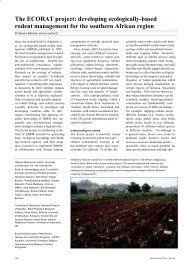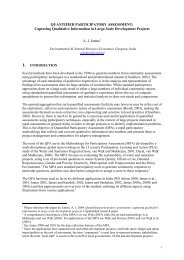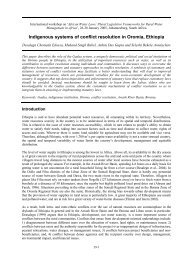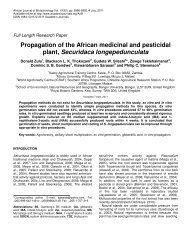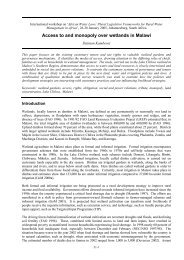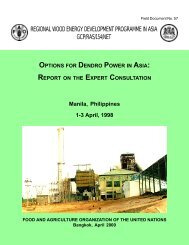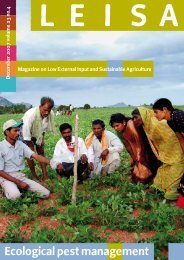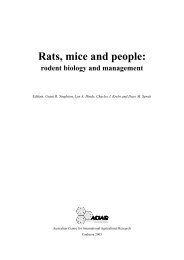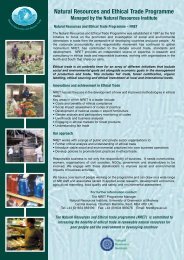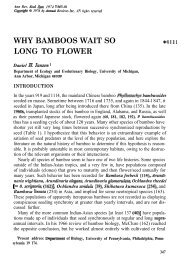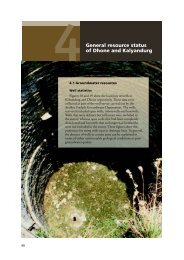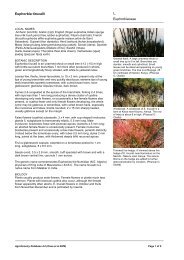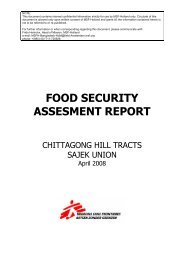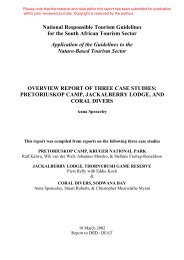Access to Rural Non-Farm Livelihoods - Natural Resources Institute
Access to Rural Non-Farm Livelihoods - Natural Resources Institute
Access to Rural Non-Farm Livelihoods - Natural Resources Institute
Create successful ePaper yourself
Turn your PDF publications into a flip-book with our unique Google optimized e-Paper software.
Box 1. Michael Dunga, coffee trader<br />
Michael is 35 years old. He was married, but his wife died, so he and his two sons live with<br />
his elderly mother, who also looks after four other children – two are the children of her first<br />
son, Michael’s brother, who died, and two are from other relatives. All are in primary school,<br />
except one who is mentally disturbed. Michael is well educated, with O levels, and used <strong>to</strong><br />
work for the district administration. When he worked for the district, he was able <strong>to</strong> put some<br />
of his salary in<strong>to</strong> a group coffee trading business. Things went well for a while, but then some<br />
of the group members began <strong>to</strong> suspect that one of them was keeping back some of the profits<br />
for hims elf. They confronted him, but all that happened was that the next time it was this<br />
man’s turn <strong>to</strong> go <strong>to</strong> market, he disappeared with all of the group’s money. Michael says that<br />
they thought that this man was their friend, but that he was desperate. Michael was retrenched<br />
in 1993 when the district administration was restructured. All his savings were lost in the<br />
coffee trading business, and since then, life has been hard. They sell some crops and he<br />
labours on other peoples’ farms <strong>to</strong> get a bit of money for soap and paraffin and a little milk for<br />
the children. His mother used <strong>to</strong> brew beer, but she is <strong>to</strong>o old now, and <strong>to</strong>o busy caring for all<br />
of the children. He can not start trading again because he has no capital and no way of getting<br />
any, and he can not get credit as they do not have title <strong>to</strong> their land. What is all the more<br />
galling is that the man who made off with the money is back in <strong>to</strong>wn, prosperous and<br />
influential.<br />
Opportunities for individual traders have increased under the government’s liberalisation<br />
policies and with the failure of the former marketing co-operatives.<br />
Trade in both fresh and dried or smoked fish is undertaken by both men and women who<br />
travel <strong>to</strong> landing sites on Lake Kijanebalola and purchase it from the fishermen or processors.<br />
Several were observed peddling their wares from bicycles, but researchers also met with a<br />
woman who lives right on the main road and who sells dried fish from a stall outside her<br />
home.<br />
There are several small shops selling basic household goods such as soap, sugar, matches,<br />
exercise books and pens, etc., as well as sodas and snack foods such as hardboiled eggs. They<br />
buy their s<strong>to</strong>ck in Kibaale, or, if they can afford the transport and intend <strong>to</strong> buy a lot, in<br />
Kyotera or even Masaka. However, many shopkeepers lack business skills, such as<br />
bookkeeping, and are thus unable <strong>to</strong> keep track of their profits, or lack thereof. Sales are<br />
closely linked <strong>to</strong> agricultural incomes – when these are down, business is very slow.<br />
There are also three petrol sellers in the village who sell small quantities of petrol <strong>to</strong> drivers<br />
who have run out. Until the middle of 2000 when one opened in Rakai Town 70 , the nearest<br />
petrol station was in Kyotera, over 20 km away. Even with the opening of the new station in<br />
Rakai, there is still plenty of business, as the drivers of the taxis (minibuses) and special hire<br />
cars which travel through Byakabanda are usually employees of the owners of the vehicles,<br />
and not the owners themselves. Typically a driver is required <strong>to</strong> give the owner of the vehicle<br />
a set amount of money each day (usually a relatively large amount), but manages the day <strong>to</strong><br />
day details of the business, including buying fuel, himself – any profit over and above the<br />
amount he is required <strong>to</strong> give the owner is his <strong>to</strong> keep, and thus drivers not only try <strong>to</strong><br />
economise on fuel use, but <strong>to</strong> estimate accurately the amount they will require so that they<br />
return the vehicle <strong>to</strong> its owner empty at the end of the day. However, sometimes they<br />
miscalculate, which is when they are forced <strong>to</strong> buy from roadside sellers.<br />
70 This proved <strong>to</strong> be short lived – it had closed down by the time this report was being completed at the end of<br />
November, allegedly as a result of mismanagement and the break-up of the group who owned it.<br />
36



